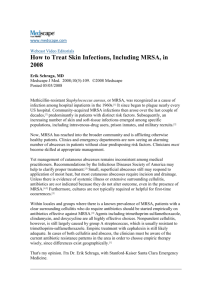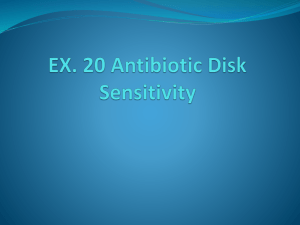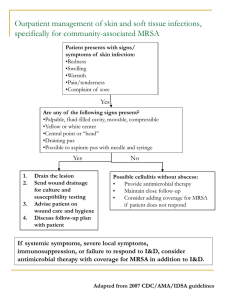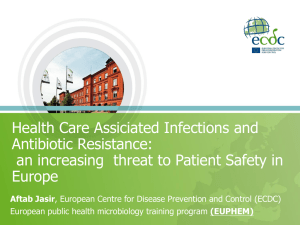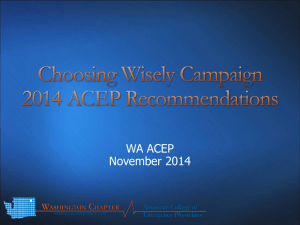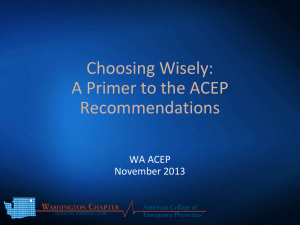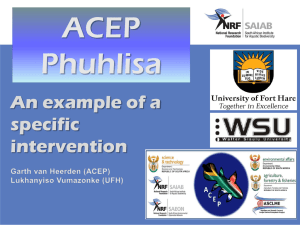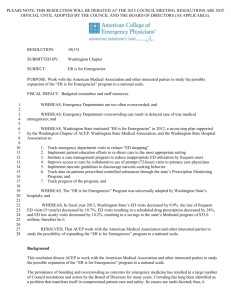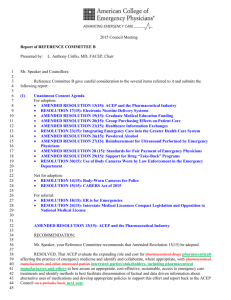Opposition to Routine Abscess Culturing
advertisement
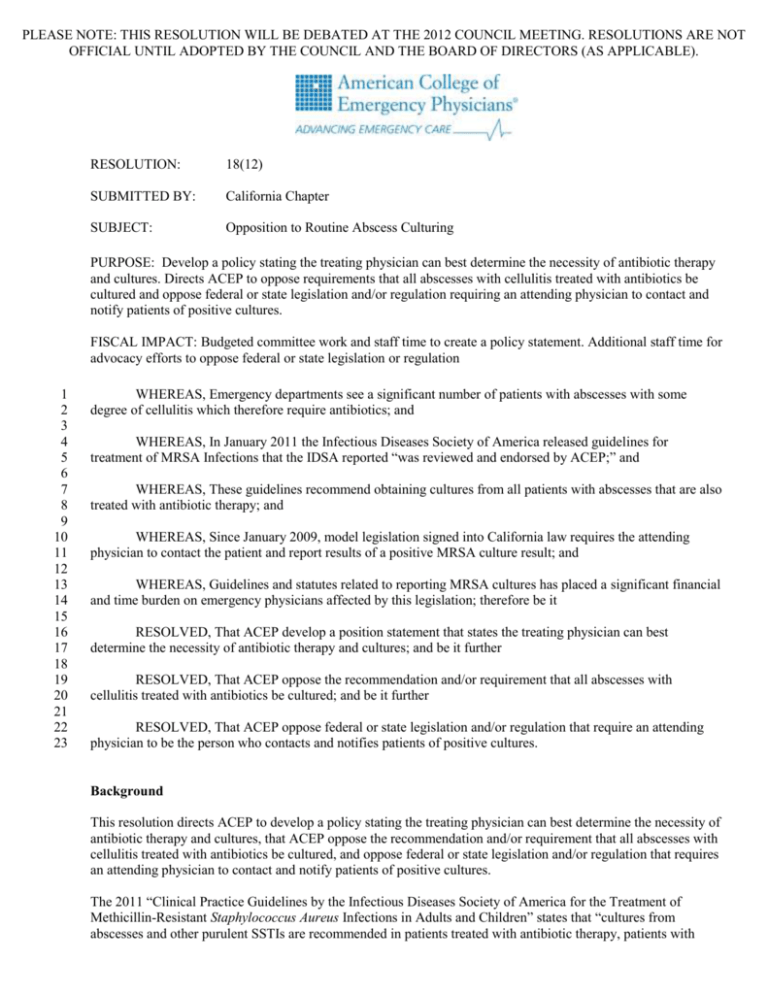
PLEASE NOTE: THIS RESOLUTION WILL BE DEBATED AT THE 2012 COUNCIL MEETING. RESOLUTIONS ARE NOT OFFICIAL UNTIL ADOPTED BY THE COUNCIL AND THE BOARD OF DIRECTORS (AS APPLICABLE). RESOLUTION: 18(12) SUBMITTED BY: California Chapter SUBJECT: Opposition to Routine Abscess Culturing PURPOSE: Develop a policy stating the treating physician can best determine the necessity of antibiotic therapy and cultures. Directs ACEP to oppose requirements that all abscesses with cellulitis treated with antibiotics be cultured and oppose federal or state legislation and/or regulation requiring an attending physician to contact and notify patients of positive cultures. FISCAL IMPACT: Budgeted committee work and staff time to create a policy statement. Additional staff time for advocacy efforts to oppose federal or state legislation or regulation 1 2 3 4 5 6 7 8 9 10 11 12 13 14 15 16 17 18 19 20 21 22 23 WHEREAS, Emergency departments see a significant number of patients with abscesses with some degree of cellulitis which therefore require antibiotics; and WHEREAS, In January 2011 the Infectious Diseases Society of America released guidelines for treatment of MRSA Infections that the IDSA reported “was reviewed and endorsed by ACEP;” and WHEREAS, These guidelines recommend obtaining cultures from all patients with abscesses that are also treated with antibiotic therapy; and WHEREAS, Since January 2009, model legislation signed into California law requires the attending physician to contact the patient and report results of a positive MRSA culture result; and WHEREAS, Guidelines and statutes related to reporting MRSA cultures has placed a significant financial and time burden on emergency physicians affected by this legislation; therefore be it RESOLVED, That ACEP develop a position statement that states the treating physician can best determine the necessity of antibiotic therapy and cultures; and be it further RESOLVED, That ACEP oppose the recommendation and/or requirement that all abscesses with cellulitis treated with antibiotics be cultured; and be it further RESOLVED, That ACEP oppose federal or state legislation and/or regulation that require an attending physician to be the person who contacts and notifies patients of positive cultures. Background This resolution directs ACEP to develop a policy stating the treating physician can best determine the necessity of antibiotic therapy and cultures, that ACEP oppose the recommendation and/or requirement that all abscesses with cellulitis treated with antibiotics be cultured, and oppose federal or state legislation and/or regulation that requires an attending physician to contact and notify patients of positive cultures. The 2011 “Clinical Practice Guidelines by the Infectious Diseases Society of America for the Treatment of Methicillin-Resistant Staphylococcus Aureus Infections in Adults and Children” states that “cultures from abscesses and other purulent SSTIs are recommended in patients treated with antibiotic therapy, patients with Resolution 18(12) Opposition to Routine Abscess Culturing Page 2 severe local infection or signs of systemic illness, patients who have not responded adequately to initial treatment, and if there is concern for a cluster or outbreak. Antibiotic therapy is recommended for abscesses associated with the following conditions: severe or extensive disease (e.g., involving multiple sites of infection) or rapid progression in presence of associated cellulitis, signs and symptoms of systemic illness, associated comorbidities or immunosuppression, extremes of age, abscess in an area difficult to drain (eg, face, hand, and genitalia), associated septic phlebitis, and lack of response to incision and drainage alone.” There is also guidance for empirical therapy for outpatients with purulent and nonpurulent cellulitis. The guidelines state that it “is not intended to supplant physician judgment with respect to particular patients or special clinical situations. The Infectious Diseases Society of America (IDSA) considers adherence to these guidelines to be voluntary, with the ultimate determination regarding their application to be made by the physician in light of each patient’s individual circumstances.” An ACEP member served on the development panel for these guidelines. Members of ACEP’s Public Health Committee and Clinical Policies Committee reviewed and provided comments on an earlier draft of the document, then reviewed the final document for endorsement recommendation to the ACEP President, who approved ACEP endorsement on November 24, 2010. The Centers for Disease Control and Prevention (CDC) states: “In general, a culture should be obtained from the infection site and sent to the microbiology laboratory. If S. aureus is isolated, the organism should be tested as follows to determine which antibiotics will be effective for treating the infection. Skin Infection Culturing: Obtain either a small biopsy of skin or drainage from the infected site. A culture of a skin lesion is especially useful in recurrent or persistent cases of skin infection, in cases of antibiotic failure, and in cases that present with advanced or aggressive infections.” Also, “MRSA is reportable in several states. The decision to make a particular disease reportable to public health authorities is made by each state, based on the needs of that individual state.” The CDC also states: “Incision and drainage constitutes the primary therapy for these purulent (MRSA) skin infections. Empiric antimicrobial coverage for MRSA may be warranted in addition to incision and drainage based on clinical assessment (eg, presence of systemic symptoms, severe local symptoms, immune suppression, extremes of patient age, infections in a difficult to drain area, or lack of response to incision and drainage alone). Antibiotic treatment, if indicated, should be guided by the susceptibility profile of the organism. Obtaining specimens for culture and susceptibility testing is useful to guide therapy, particularly for those with more severe infections and those who fail to respond adequately to initial management. MRSA skin infections can develop into more serious infections. It is important to discuss a follow-up plan with your patients in case they develop systemic symptoms or worsening local symptoms, or if symptoms do not improve within 48 hours.” A reference and link to the IDSA MRSA guidelines is included on the CDC Website. According to RID (Reduce Infection Deaths), a not-for-profit educational campaign regarding hospital infections, as of October 2011, twelve states have laws requiring the screening and/or reporting of hospital-acquired MRSA rates, and three states have legislation pending on this matter. Numerous educational sessions at ACEP meetings have addressed wound management and antibiotic use. EMRA continues to publish the Antibiotic Guide. ACEP Strategic Plan Reference Enhance emergency care through federal and state policy initiatives. Fiscal Impact Budgeted committee work and staff time to create a policy statement. Additional staff time for advocacy efforts to oppose federal or state legislation or regulation. Resolution 18(12) Opposition to Routine Abscess Culturing Page 3 Prior Council Action Substitute Resolution 23(98) Appropriate Use of Antibiotics adopted. Directed ACEP to explore working collaboratively with other organizations to develop educational materials for physicians and the general public on the consequences of the unnecessary use of antibiotics. Prior Board Action October 1998, adopted Substitute Resolution 23(98). Background Information Prepared By: Rhonda Whitson, RHIA Clinical Practice Manager Reviewed by: Marco Coppola, DO, FACEP, Speaker Kevin Klauer, DO, EJD, FACEP, Vice Speaker Dean Wilkerson, JD, MBA, CAE, Council Secretary and Executive Director
